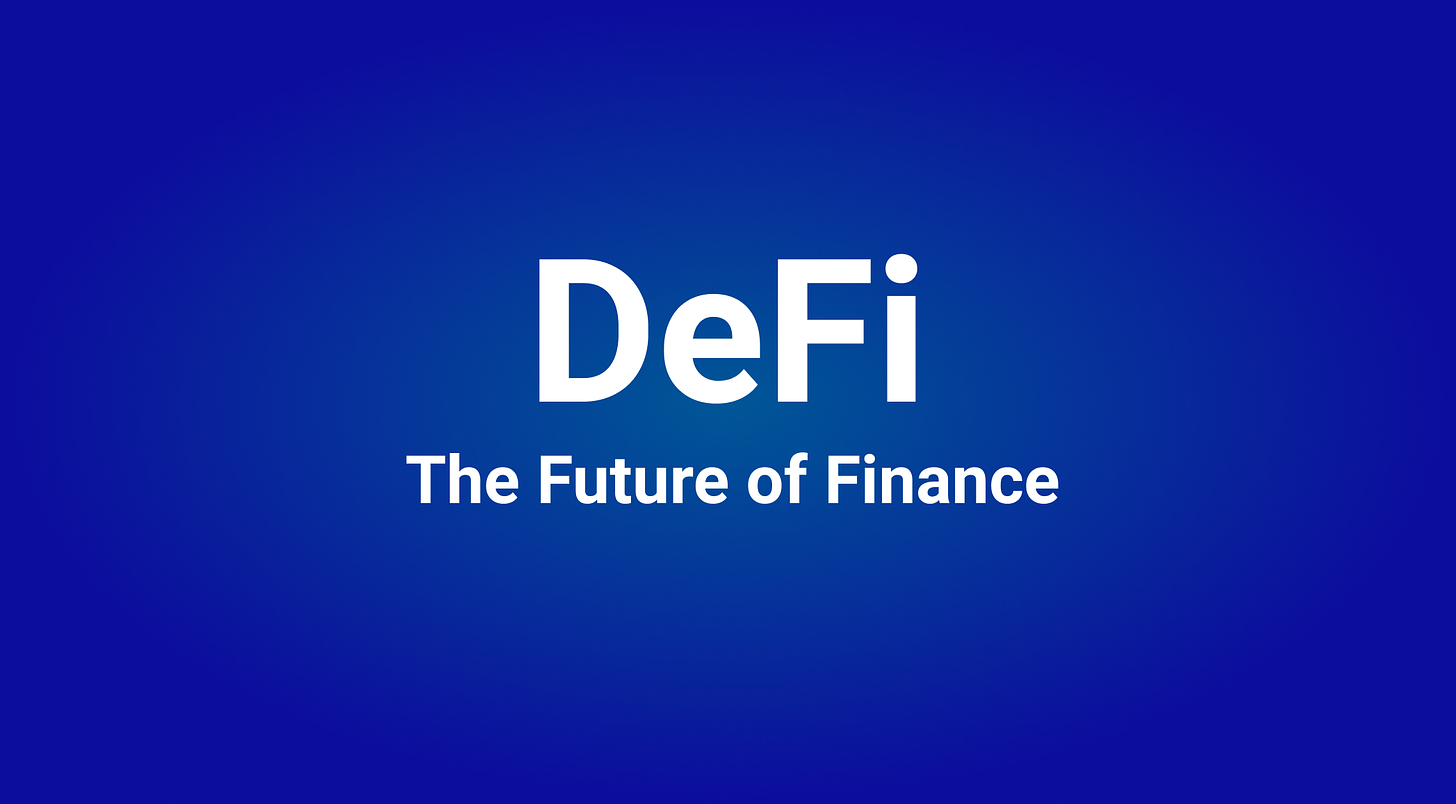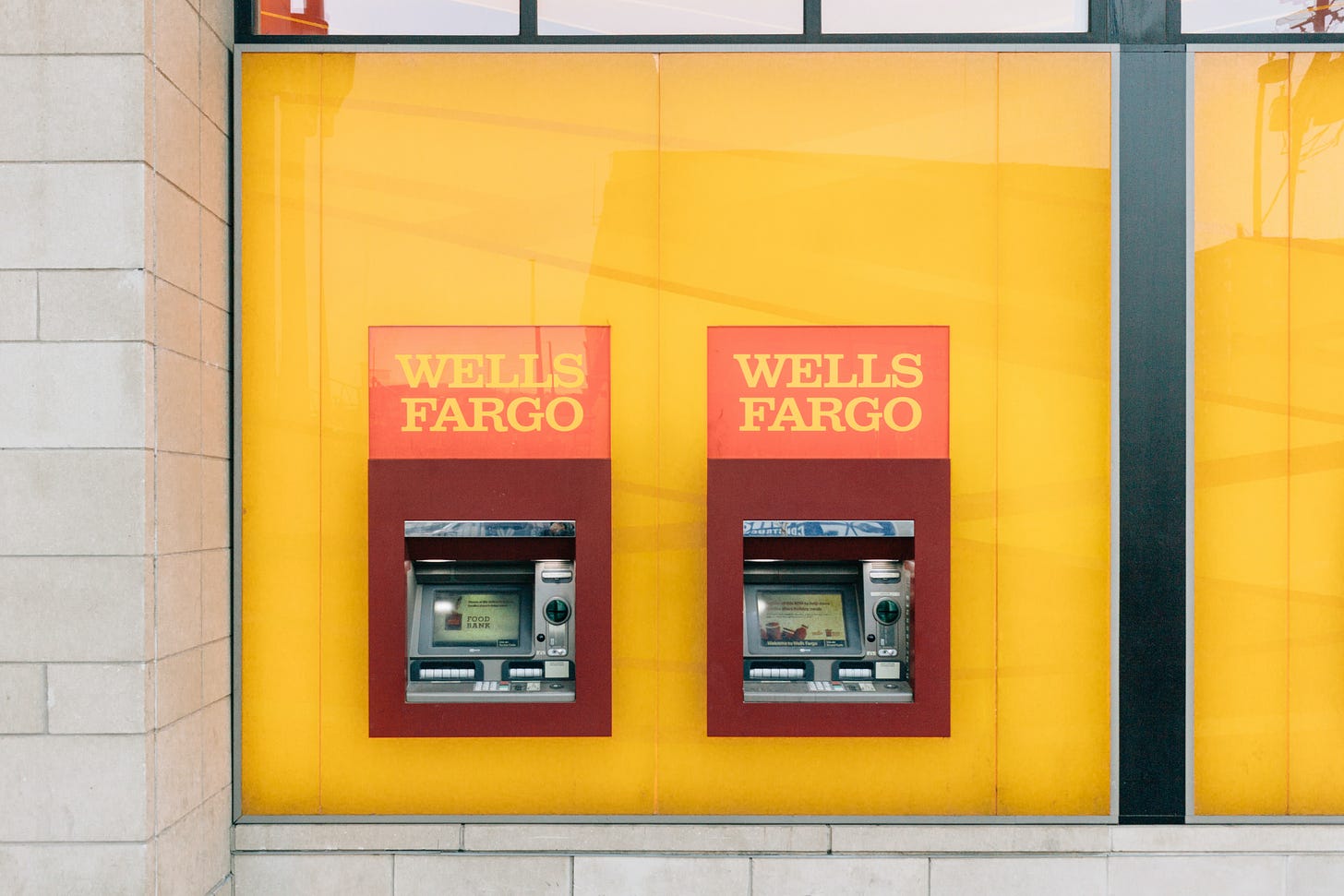What is DeFi?
DeFi stands for decentralized finance, which might sound super boring to non-crypto, non-finance people. I promise it's not, though! There is a world of innovation happening in DeFi and we're still just getting started.
It's tough to put an exact definition on DeFi, but Marvin Ammori has a great one:
...the ecosystem of blockchain-enabled products and services that replace traditional financial intermediaries with freely accessible, autonomous, and transparent software
If you're just getting into crypto, that definition may seem daunting and full of words you don't understand. Hopefully by the end of this article, it'll make a little more sense to you.
More simply, you can think of DeFi in contrast to traditional finance (TradFi).
What's TradFi?
TradFi is our legacy financial system. It's what we use every day when we deposit checks, take out loans, or trade stocks on a brokerage.
All these products use fiat (government issued) currencies like the US Dollar, British Pound, or Euro. They're also run by centralized companies, like Wells Fargo or Bank of America, who retain a lot of discretion and control over their products.
What's Wrong with TradFi?
TradFi is the backbone of our financial system today, and when it works, it's great. We've made consistent advances through digitization. Transferring assets, making trades, and taking out loans has never been easier. And TradFi works great... until it doesn't.
In my mind, there are 3 areas where TradFi falls flat today:
Too much control
Outdated regulations & technology
Slow & inefficient
Discretion & Control
TradFi companies have full control over their products and services.
If Bank of America doesn't want you to be able to withdraw $5,000 from your checking account, they can just stop you from doing so! If PayPal or Venmo wanted to stop you from sending money to someone else, they can always just block the transaction and you'll have little to no recourse.
TradFi is able to do this because its products are run by centralized institutions.
Outdated
TradFi has outdated regulation and often uses outdated technology.
In January 2021, thanks to Reddit's WallStreetBets, Gamestop saw its market cap climb from $300 million to over $30 billion. Retail traders bought stock and call options, driving volatility and prices to astronomical levels. During the height of the volatility, trading platforms like Robinhood had to suspend trading of Gamestop and other meme stocks.
Users were (justifiably) angry and Robinhood took a lot of flak for this decision. In the end, I think the problem was caused more by clearinghouse regulations than it was by Robinhood. Still, should this have happened? No, this is not 1980. People should be able to buy and sell the stocks they choose instantaneously. TradFi is still taking 2 business days to settle transactions... why?? We make trades in milliseconds, so there's no reason for settlement to take days.
This holds true in many other areas of finance. Why does an ACH transfer take 3 business days? Computers don't sleep; we should be able to transfer money whenever we want.
Slow & Inefficient
Finally, TradFi is just slow and inefficient. Thanks to the high level of human involvement and huge, legacy organizations, banks and financial institutions have become slower and more ineffective.
All this means that TradFi institutions - banks especially - are not innovators. This isn't a problem that's inherent to TradFi, but it's the state of the industry today. Institutions have become lazy, and their products and customers suffer for it. Here are a couple examples:


Why is DeFi the Future?
DeFi cuts out these middlemen and gatekeepers. And because DeFi is built on the blockchain, it has a number of inherent advantages over TradFi. To name a few of the biggest:
Open, auditable smart contracts and data - DeFi products run on smart contracts (code). Any smart contract on the Ethereum blockchain is public. You can read all the code and see for yourself how your money will be used. (Or, you can rely on auditors to do it for you). Also, all transactions on Ethereum are public; it’s much easier to audit a company’s data if you need to, making it harder for fraudsters to steal people’s money.
Permissionless - You don't need to seek anyone's approval to use DeFi apps. If you want to take out a loan on Aave, you just need to provide the correct amount of collateral. There's no need to jump through hoops, create accounts, or wait days for human approval. Just deposit the right collateral and take out your loan.
Also, no one can stop you from creating a decentralized app. In our current system, if Amazon decides they don’t like you, they can just turn off your access to their servers. The same is not true for Ethereum. Whether you’re a user or a developer, you can use and create decentralized apps. It doesn’t matter what you look like, where you’re from, what school you went to, who you know, or what your political beliefs are.
Decentralized - No one person can control the blockchain, so no one person can take you down, freeze your assets, or stop you from using their program, either. Even if a DeFi project wanted to stop you from using their product, there's no way they can!
Fast, Frictionless, & Autonomous - Imagine you want to close a stock brokerage account and transfer the stocks onto a new broker’s platform. If you have any experience dealing with brokerages, you know how much of a hassle that process will be. But on DeFi rails, the process could take just 10 minutes. That's because the smart contracts on top of the blockchain can be executed without human intervention, making them quicker and more efficient.
Composability - DeFi products and tokens tend to be highly composable. Think of each DeFi product as a Lego that can be stacked on top of another. You can take one product, couple it with another and everything just works. For instance, you could stake your ETH with Lido, then take out a loan against your stETH (in theory - many of these features haven't been built yet).
These benefits allow for so many unique and interesting applications. And the thing is, we're only getting started. Just like the Internet allowed for things that people could conceive of in 1990, DeFi will allow for new financial products that we can't even fathom yet
I'm going to be examining different decentralized applications each week and breaking them down with easy-to-understand explanations.
Next week, we'll take our first step into DeFi and get set up to start using real world DeFi projects!
More Reading on DeFi
Next week’s preview: MetaMask, your portal to DeFi






Do you see a future where collateral is not limited to crypto?
Looking forward to hear more bro!